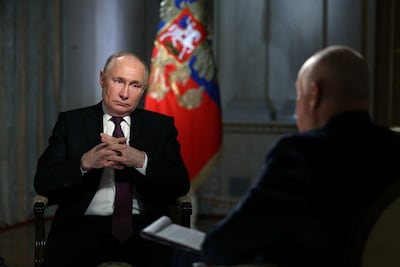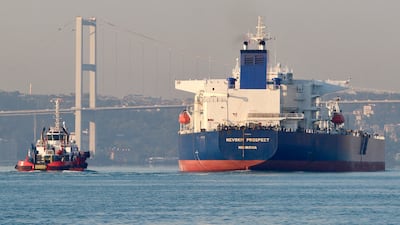Oil prices rose on Wednesday after Opec stuck to its oil demand projections and raised its forecast for economic growth this year.
Brent, the benchmark for two thirds of the world’s oil, was trading 0.45 per cent higher at $82.29 a barrel at 11.21am UAE time. West Texas Intermediate, the gauge that tracks US crude, was up 0.49 per cent at $77.94 a barrel.
On Tuesday, Opec raised its estimate for global economic growth this year by 0.1 per cent to 2.8 per cent, citing “robust” economic expansion in the second half of 2023.
The group expects oil demand growth of 2.2 million barrels per day for this year, much higher than the International Energy Agency’s estimate of an increase of 1.2 million bpd.
The IEA, which is due to release its monthly oil market report later this week, has previously said that oil demand would come under pressure this year from a consumption slowdown in China, the world’s largest energy importer.
Opec also said that the extension of voluntary cuts by the Opec alliance, which includes Russia, would lead to non-Opec crude production growing by 1.1 million bpd this year, down 120,000 bpd from the group’s previous projection.
This month, several members of the Opec group of oil producers, including Saudi Arabia, the UAE and Kuwait, announced they were extending voluntary supply curbs of 2.2 million bpd into the second quarter to support market balance and stability.
“We think the oil market will tighten already next quarter, driven by voluntary production cuts of Opec member states and lower Russian production, while oil demand remains healthy,” said Giovanni Staunovo, strategist at UBS.
Opec may reintroduce some additional barrels into the market by mid-2024 to meet the seasonal growth in demand, Mr Staunovo told The National.
On Tuesday, Russian President Vladimir Putin said that Opec cuts helped in maintaining oil prices and increasing Moscow’s revenue, but warned that it could result in the country losing market share.
“Since oil production declines and it grows in other countries like the US, then Russia may lose markets,” Mr Putin told the state-owned Tass news agency.

In the second quarter, Russia, in co-ordination with some Opec countries, will further reduce its oil production and exports by 471,000 bpd. It has been reducing crude oil and fuel exports by a combined 500,000 bpd in the current quarter.
The US and the EU have imposed dozens of sanctions on Russia, particularly targeting its oil and gas exports, to limit Moscow’s ability to finance its war in Ukraine.
Meanwhile, the US Energy Information Administration has lowered its forecast for global crude production growth this year, citing Opec output cuts.
“Because some Opec members are extending these voluntary production cuts and because Russia added new voluntary production cuts, we now expect oil markets to be much tighter in the [second quarter] than we previously expected,” the EIA said.
The US Department of Energy’s statistical arms expects global oil stocks to decrease by 900,000 bpd in the upcoming quarter of 2024.
It had previously forecast that inventories would likely remain stable during the same period.

